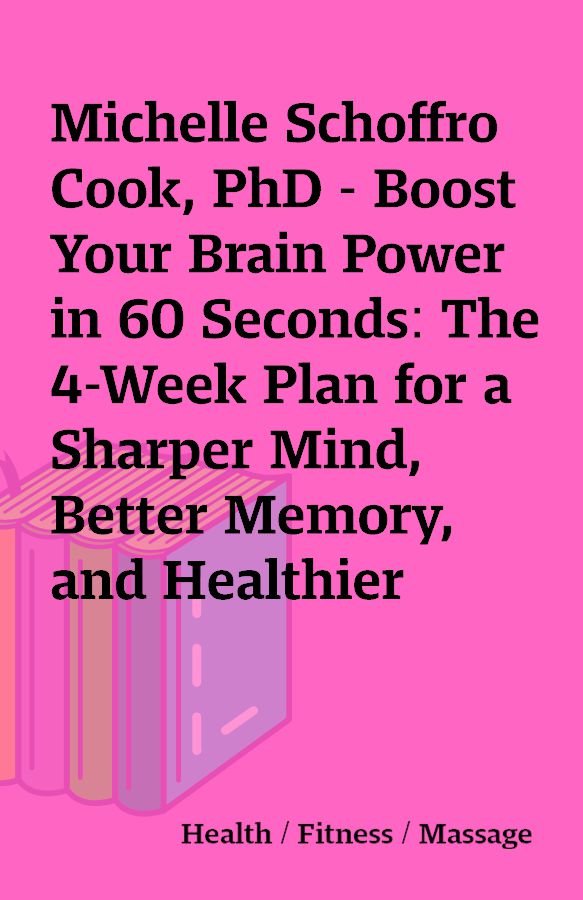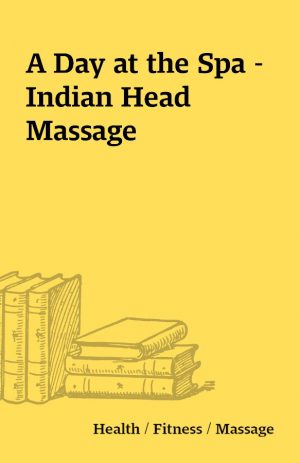Michelle Schoffro Cook, PhD – Boost Your Brain Power in 60 Seconds: The 4-Week Plan for a Sharper Mind, Better Memory, and Healthier Brain
Boost Your Brain Power in 60 Seconds – Michelle Schoffro Cook.epub
[1 eBook – 1 Epub]
Description
Scientists predict that within 8 years, brain disease will kill or disable more people than cancer and heart disease combined. Given this shocking new research, we urgently need to know how to protect and improve our brain health.In Boost Your Brain Power in 60 Seconds, Dr. Michelle Schoffro Cook aims to turn this prediction around with her prescriptive—and proven—plan. Several years ago, Dr. Cook was in a terrible car accident in which she suffered a brain injury, resulting in cognitive impairment, partial paralysis in her left arm, and severe migraines. Utilizing her expertise in natural medicine, Dr. Cook developed a program that improved her memory, cured her migraines, and reversed her arm paralysis. After her recovery, she continued to research natural methods to improve memory, reduce memory loss, and prevent degenerative brain diseases.Boost Your Brain Power in 60 Seconds is an easy, customizable, 4-week plan filled with fun, doable tips you can execute in just 60 seconds a day, including 50 delicious recipes featuring brain-boosting superfoods, encouraging success stories, and a self-assessment quiz.Editorial ReviewsAbout the AuthorMichelle Schoffro Cook, PhD, holds advanced degrees in natural health and holistic nutrition and has been featured in Woman’s World, First for Women, the Huffington Post, and other publications. She is a regular blogger for healthysurvivalist.com, care2.com, and worldshealthiestdiet.com. She lives in Alberta, Canada.Excerpt. © Reprinted by permission. All rights reserved.CHAPTER 1YOUR MIRACLE BRAINThe human brain, then, is the most complicated organization of matter that we know.ISAAC ASIMOV, FOREWORD TO THE THREE-POUND UNIVERSE BY J. HOOPER AND D. TERESIIn our modern, digital age, you may be inclined to think that computers are far superior to the human brain, but you’d be wrong. The human brain is one of the most miraculous things on the planet. It is not only capable of advanced thought processes, but it can also change itself to suit its environment and lifestyle. But I’m getting ahead of myself.Your brain controls all of your bodily functions, moods, memories, and intellectual processes. Whether your brain is healthy and functioning well determines, to a large degree, your experience of the world and that within your own body. Yet we rarely give this impressive organ a second thought. Unless your memory starts to falter or you develop a nervous system condition, you are likely to neglect this powerful orchestrator of your body and, to a large extent, your life.For many years, scientists led us to believe that we had little control over our brains and their functioning, and even their health. You may have heard from news reports or through your education that the brain is static: Once you hit a certain age, your brain was finished developing. You couldn’t improve your intellectual capacity, since that was largely due to genetics, or so we were told. Worse than that, if you developed a brain disease, there was nothing you could do except hope for some miracle drug to help restore your brain health.Now we know that these outmoded teachings and beliefs are completely wrong. More and more research shows that we have a tremendous amount of control over our brain capacity and health. What we eat, how we live, how much we challenge ourselves, how stressed we are, and many other factors play significant roles in our overall brain health, cognition, and memory, as well as our moods, resistance to brain diseases, and more. While genetics, of course, plays a role, it is not the be-all and end-all we were originally taught.The statement “you are what you eat” has never been more apt than when discussing brain health. I would expand the original sentiment to “you are what you eat, learn, and live” to reflect that our lifestyle choices have a significant influence on our short- and long-term brain health. We are in an exciting time, during which brain research is skyrocketing and our knowledge of how to keep our brains healthy and prevent brain disease is climbing sharply, as well. Throughout Boost Your Brain Power in 60 Seconds, I will share the latest, greatest scientific advances about the brain and memory, along with simple ways you can put the research to work for you in your own life to maximize brain health results.What if you could transform your life in 60 seconds or less each day? What if you could improve your memory while protecting your brain with simple, all-natural foods, herbs, nutrients, and other remedies that are proven to enhance brain health? That’s the promise of Boost Your Brain Power in 60 Seconds!Whether you’re a jet-setting professional, a working parent juggling multiple jobs, or a busy student, the reality of our hectic world is that few of us have enough time to give our health the attention it deserves. But all of us, no matter how busy, can find 60 seconds a day to transform our brain health and lives. Before we discuss the plan and the 60-Second Brain Health Tips you’ll find throughout this book, I’d like to share some personal information about how this book and the program within its pages came to be.THE ORIGINS OF BOOST YOUR BRAIN POWER IN 60 SECONDSMore than 20 years ago, I suffered from a traumatic brain injury after being involved in a serious car accident. I partially severed my spinal cord and had other injuries, as well. The car was totally destroyed, except for a small part of the door, which allowed me to get out of the car. Immediately after the accident, I lost most function in my left arm and had a breathing impairment. I began suffering other effects of the brain injury, as well, including severe and steady migraines that became a part of my life for many years. As if that wasn’t enough, a couple of years later I slipped and hit my head, resulting in a second traumatic brain injury and the aggravation of many symptoms from the car accident. While many of the accident’s effects were immediate, some of the effects of the traumatic brain injury took longer to notice, including memory deficits and depression.In a desperate effort to alleviate the horrendous pain, breathing impairment, partial paralysis, and other symptoms that consumed so much of my life, I began applying my background in nutrition and herbal medicine, and later in natural medicine and acupuncture. I focused on the best ways to heal from a traumatic brain injury and the food and lifestyle choices that support healthy brain function.Later, as my health improved, I worked with thousands of patients, including many with brain disorders such as Alzheimer’s disease, autism, clinical depression, dementia, Parkinson’s disease, traumatic brain injury, and others. I applied my research and the program I had created for my own health to my patients, as well, with excellent results. Throughout this book, I’ll share the discoveries, research, and methods that I have used to treat myself and thousands of clients over the years.I hope that my experience and knowledge will help you improve your brain health and memory and prevent serious brain diseases. More recently, together with my publisher, Rodale, I developed and conducted a 4-week brain health challenge by applying the program outlined in this book to see if we could get significant memory and brain health results in as little as 4 weeks. The results were impressive. The participants in the 4-Week Brain Health Challenge who made the minimum effort to apply this program to their lives had great results. Throughout this book, I will share some of their stories and experiences on the Boost Your Brain Power in 60 Seconds program.One of the most common sentiments I heard from patients and the brain challenge participants was how easy the program is to apply to day-to-day life. Additionally, most people were surprised by how quickly they began to notice results, not just with memory and mental clarity, but also with energy, moods, and weight.It seems that many people–myself included, at one time–accept memory loss as a part of life. But new scientific research is showing that we will no longer have to accept a declining memory as “just a part of aging.” Scientists continuously prove that smart nutrition and a healthy lifestyle go a long way toward protecting your brain and memory from damage.Before I share the research-based program I developed over more than 22 years, it is valuable to assess your current brain health status. While the best way to fully assess your brain health is through diagnostic tests performed by your doctor, you can also gain insight into your brain health and how your diet and lifestyle choices may be impacting it, either positively or negatively, by completing the brain health assessment on page 10. Of course, if you are suffering from any brain disease or symptoms of a brain injury or impaired mental function, you should see your doctor. But even if you’ve been diagnosed with a brain disease such as Alzheimer’s, Parkinson’s, dementia, or clinical depression, you will likely find that this plan can help slow, or even potentially reverse, many of the symptoms or even the disease progression. Alternatively, even if you have no signs of a brain disease and simply want to ensure long-term brain health and prevent future brain illness, you will find the program easy to follow and implement in your life.The Facts about Alzheimer’s Disease and Parkinson’s DiseaseYou likely know someone, perhaps even a close friend or relative, who has been diagnosed with Alzheimer’s disease or Parkinson’s disease. Let’s take a closer look at these disorders, including the most common symptoms.Alzheimer’s disease is a brain disorder that starts with memory loss and eventually leads to full-blown dementia. There are many symptoms associated with this disease, including memory problems, confusion and disorientation, inability to manage tasks, hallucinations and delusions, episodes of violence and rage, episodes of childlike behavior, paranoia, depression, and mood swings.Alzheimer’s affects a part of the brain called the hippocampus, which is responsible for memory and intellect. Neurons in the hippocampus become entangled, resulting in lost brain cells and abnormal protein fragment formations called plaques or amyloid plaques. Scientists are still unsure whether the tangles and plaque formation cause Alzheimer’s disease or whether they are a side effect of the condition. Wherever the plaques are formed in the brain, there is accompanying inflammation, suggesting that inflammation is a factor in the disease.Parkinson’s disease is a disorder of the nervous system that affects movement. The condition develops gradually and usually starts with barely noticeable tremors in one hand. Tremors are the most known sign of the disease, but Parkinson’s also causes stiffness or slowing of movement, lack of expression, and slurred speech. While there is no known cure for the disease, diet and lifestyle may help slow the condition and improve quality of life for sufferers.Signs of a Traumatic Brain InjuryAfter I slipped and hit my head, I had a headache but no other symptoms to suggest that I might have had a concussion. I went to sleep that night, which is contraindicated with concussions, but I didn’t know I had one. The next morning, I awoke and stepped out of bed. I collapsed in a heap when my legs didn’t support any weight. I looked sort of like Bambi, the baby deer, first learning to walk. I pulled myself over to the phone and made arrangements to get to a doctor, who assessed me and immediately confirmed that I had a traumatic brain injury. In addition to a possible lack of communication between the brain and limbs, here are some other symptoms of a traumatic brain injury.1 Keep in mind that the symptoms may vary depending on the severity of the brain injury and the part of the brain injured. It is important to be examined by a doctor as soon as you suspect a traumatic brain injury.PHYSICAL SYMPTOMS• Clear fluids draining from the nose or ears• Convulsions or seizures• Difficulty sleeping• Dilation of one or both pupils• Dizziness or loss of balance• Excessive sleepiness• Fatigue or drowsiness• Inability to awaken from sleep• Loss of consciousness, for anywhere from a few seconds to a few hours• Loss of coordination• Nausea or vomiting• Persistent headache or a headache that becomes progressively worse• Weakness or numbness in fingers and toesFile Size: 2537 KBPrint Length: 306 pagesPublisher: Rodale Books (November 1, 2016)http://www.amazon.com/Boost-Your-Brain-Power-Seconds-ebook/d…
You must be logged in to post a review.






Reviews
There are no reviews yet.